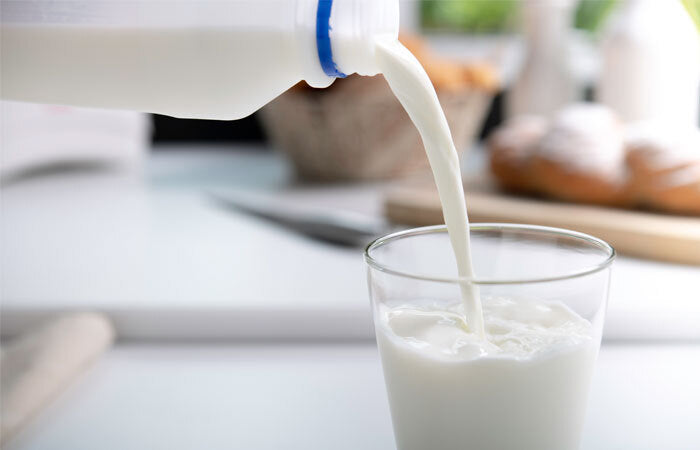Did you know you can use salt in many ways in emergencies?
It can extend the shelf life of milk, put out a grease fire, relieve bee stings, and lots more.
Here are 20 ways you can use this humble-yet-amazing seasoning in an emergency.
1. Put Out a Grease Fire
Like baking soda, salt can be used to put out grease fires. Unlike baking soda, however (which chemically extinguishes flames) salt works by absorbing heat and smothering the fire.
This can be a lifesaver in disasters like earthquakes when the occurrences of gas and electrical fires tend to skyrocket.

Salt absorbs heat and will smother a grease fire.
One thing to note is that it may take quite a bit of salt to get the job done—up to a cup or two—depending on the size of the fire.
2. Frost-Free Windows
Salt and water can also keep your windows frost free which helps warm your home in the event of a power outage.
Apply a warm saltwater solution to your windows with a sponge. Then, when the temperature drops below freezing, ice will not form on the glass. It’s as easy as that.
3. De-Fog Your Car Windshield
Frost and fog-free windows are also important in your car, especially in rough winter weather.

A solution of salt and water will help defrost and de-ice car windows.
Mix one tablespoon of salt into two cups of water and apply the mixture to your car’s windshield. That will safely melt the ice. Careful not to overdo it—too much solution can damage your windshield.
4. Deodorize Shoes
When you’re wearing one pair of shoes in emergency…let’s just say they start to take on a certain “odor.”
The good news is that with salt, deodorizing shoes is easy. That’s because salt absorbs just about everything, including stinky feet smell. If your shoes have seen better days, just put a bit of salt in them next time you wear them.
5. Relieve Bee Stings
When it comes to First Aid for bites and stings, prevention is the best route. Barring that, salt can actually help you treat a bee sting. This one’s a bit of a cheat because it requires Epsom salt rather than a standard table salt.

Epsom salt and water reduces swelling and relieves pain from a bee sting. It also draws the stinger to the surface.
A simple paste made from Epsom salt and water can relieve some pain when applied to the bee sting. That’s thanks to the magnesium and sulfate which help to reduce swelling and can even draw the stinger to the surface.
6. Kill Poison Ivy
This is a little more of a wilderness survival hack, but if you find poison ivy around your campsite or bugout location, salt will kill it quickly. Put one cup of salt in a gallon of vinegar and mix until the salt dissolves, then pour it over the plant.
7. Rotten Egg Test
Sorting rotten food out from the good stuff is a critical survival skill, and salt can help—at least with eggs. Eating or even handling a rotten egg carelessly can expose you to Salmonella, and that’s the last thing you need in an emergency situation.
Of course, the smell of a rotten egg is usually a dead giveaway. But depending on the conditions you’re in and the state of the egg, a second method can’t hurt.
Put an egg in salt water and if it sinks to the bottom and lays on its side, the egg is fresh. If the egg floats to the top, best to throw it out. That egg is rotten.
Want eggs that last for up to 10 years? Check out this Dried Whole Egg Powder.
8. Repel Flies
Flies are always pesky, even more so in emergencies where you’re spending time outside. Researchers suspect that house flies carry at least 65 illnesses, including dysentery. It’s best to do whatever you can to keep them away, and salt can help with that.
Just add two tablespoons of salt to a glass of water and use it as a spray. Apply to areas that flies frequently give you problems. The solution will repel them instantly.
9. Take Bitterness out of Coffee
Is there a greater emergency than too-bitter coffee?
We kid, but seriously…if you like smooth coffee, adding some salt can cut away any bitter edge.
Add half a teaspoon of salt to a cup of coffee and see for yourself!
10. Clean Cutting Board
Cleaning a cutting board can be difficult. With all the tiny nicks and scores, food can really get stuck.
To help make sure you get everything out (and prevent contamination), pour one-third cup of salt on your cutting board and wait 10 mins. Then take a lemon and rub the salt into the cutting board. The citric acid will cut grime and is also a mild antiseptic (though not on par with solutions like isopropyl alcohol). The salt is a strong scouring agent.
After you complete that process, remove all the salt and lemon with hot water.
11. Washes a Cast Iron Skillet
Though not ideal for a bug-out bag, there are few things better than a cast-iron skillet when you’re sheltering in place. Salt and heat are the preferred combination for cleaning cast iron skillets in a way that prevents rust.
12. Mouthwash

Saltwater mouthwash helps ease pain after tooth extraction or relieve a sore throat.
Using a saltwater mouthwash has many different health benefits. Just add one-half teaspoon of salt to one cup of warm water. It can help with mouth sores, ease pain after a tooth extraction, and even help relieve a sore throat or tongue.
13. Remove foul smell from a water bottle or thermos
Salt and ice can remove odors and tastes from a thermos. It’s a handy little hack if you’re in a bug-out situation using just one drinking container for all your liquids.
Fill the thermos about a quarter full with ice, add two to three tablespoons of salt over it (the larger the grain, the better), screw on the lid, and shake hard. Remove the lid and let it air dry.
14. Keep Cheese from Molding
Do you can cheese? Then here’s a hack for you. If your cheese has a brine that is going bad, you can replace it with salt brine and extend the shelf life. Put one tablespoon of salt in a few cups of water to prepare your brine.
15. Ward Off Fleas
If you have ever fallen victim to fleas, you know trying anything to get them gone is worth doing.
Use salt to get rid of them.
Pour fine salt to cover your carpet. It will act as a drying agent to help kill adult fleas. Just leave the salt on the carpet for a day or two and then vacuum it up
16. Keep Out Ants
As we prepare our homes for seasonal change, pest control is always top of mind. And no pest is more ubiquitous than ants.
And salt can help you get rid of them!
Ants love food but don’t do well with salt—it apparently wreaks havoc on their exoskeleton. To keep them out of your home, put salt in the places they crawl. Eventually, it will send them looking for an easier path.
17. Prevent Cut Fruit from Browning
We talk a lot about steps to take to preserve food before an emergency, but what about once it’s prepared? Here’s a way to help bump up the shelf life of fruit.
Mix one-eighth teaspoon of salt in one cup of water. Then soak the sliced fruit for a few minutes and drain the saltwater. This will prevent fruit from browning after it’s cut. When you are ready to eat it, just rinse.
18. Extend the Shelf Life of Milk

A pinch of salt can help extend the life of refrigerated milk up to a week.
Here’s another trick for preserving everyday foods after a disaster hits. Add a pinch of salt to a gallon of milk to make it last longer. You will not see dramatic increases in shelf life—usually about a week or so past the expiration date—but in an emergency that can make a HUGE difference. This timeline assumes you have some way to refrigerate your milk.
Click here for milk that stays fresh and shelf stable for decades.
19. Remove Rust
To remove rust just pour salt over the rusty area and then apply lime juice. Let that sit for a few hours and the rust will scrub right off.
20. All-Purpose Cleaner
We’ve touched on this a little bit already, but salt can be a very effective cleaning and scouring agent. In the absence of other cleaners, salt can:
- Remove Blood Stains
- Remove Grease Stains
- Remove Wine Stains
- Clean Coffee Stains
- Clean up an Egg
- Clean Oven Spills
- Clean Glass Top Stove


10 comments
Eva Graham
Just read through your salt hints. Thanks, I learned a lot. Will apply most of your hints.
Cheryl Cope
Prepping for “whatever” comes. God bless.
Pamela
I enjoyed your article 20 ways to use Salt in emergencies. I was wanting to print it and keep the information. But I could not find a way to delete all the pictures and just get the information. When I tried to print it, it was 9 pages long! I have had this happens alot with many different subjects that you have put on your site, when I try to print all your great information. When you have a print version next time can you look into just being able to print the information without all the nice pictures?
Ellis east
This is great stuff
Sally Six
Thank you for the hints and ideas.
Teri
I grew up poor, and a long time ago was a “starving student”. We often ran out of toothpaste with no money to buy more. We used salt to brush our teeth at these times. My dentist said it certainly was better than brushing without anything on the toothbrush! My mother spent her childhood in Germany during WW2, and it was all they had for toothpaste!
Walter Singleton
Good stuff.
Diane
I like the idea for cleaning a water bottle or thermos, but if you are in a bug-out situation where do you get the ice?
Dolores Fleming
Salt water was also excellent to get rid of weeds in my rock landscaping. It made the ground uninhabitable for future weeds and did not have a harmful effect as synthetic chemicals.
OMAR ABRAHIM
Also, in a power outage you can put ice and salt into a cooler and the chemical reaction will drop the temperature to below freezing. Salt lowers the freezing point of water. (Anyone who’s ever made home made ice cream will know this trick.) Best best is to put a wired or wireless thermometer in the cooler to monitor the temperature. In the event of an extended outage, it will buy you a little more time for your frozen foods.